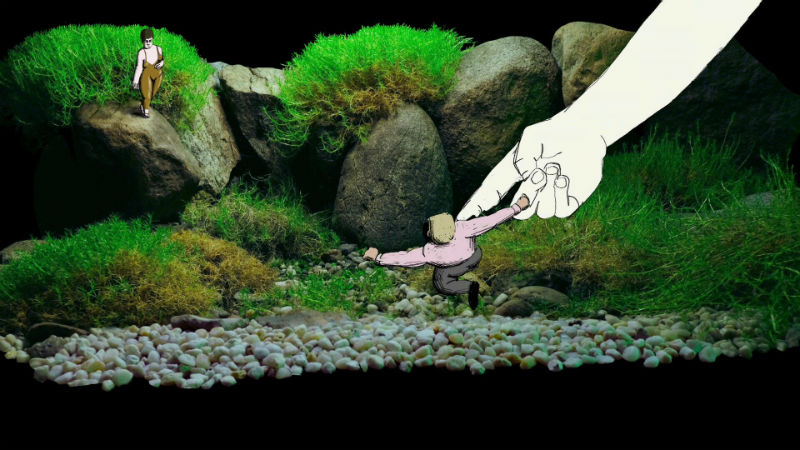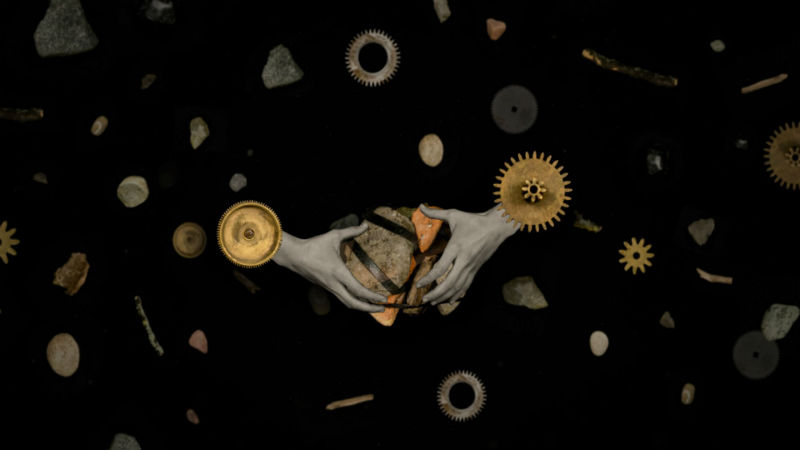




In 2016, 141 political economists tried to ban the ideas from Christian Felber’s book Change Everything: Creating an Economy for the Common Good (ECG) from being referred to in the Austrian education system. Felber’s game-changing book has, however, been acclaimed as a sustainable economic model by the European Economic and Social Committee and recommended for integration into not only Austrian but wider European law.
Felber’s 2015 text offers an alternative to the high human and environmental cost of capitalism with a new economic model that supports human and humane development, utterly reorienting our relationship to work, money, and the purpose of both. In response to the censorship battle, Austrian chamber orchestra Klangforum Wien (who are one of the 1700 companies signed up to the ECG movement) in collaboration with Waltraud Grausgruber of the Tricky Women Festival, invited 10 animators to work in partnership with 10 composers to create 10 short, animated films that explore themes inspired by Felber’s economic manifesto.

.
Women have the power
Paired together on the style and basis of their previous work, the animators and composers – all women – would be equal partners for the project, and would work closely together over a two-year period overcoming the challenges of geographical separation and work commitments. “Why not try to find out if women think differently?” says Therese Zalud of Klangforum, “because after all, it’s mostly men who run the economic world and protested against the ECG.” Zalud explains Klangforum’s decision for a female-led project, “let’s find out if women can find alternative ways for working-together, in a project which is itself an example of a working relationship based on equal rights.”
Ideas would be shared back and forth over two years between the paired collaborators until eventually the films would be presented in an anthology feature film called The Happiness Machine. The experimental shorts explore the values of the ECG, which include human dignity, cooperation, ecological sustainability, social justice and transparency using a range of styles and techniques to tell their stories, ranging from collage and drawn or painted images to clay, photos, moving image and stop motion.
“I worked with real plants, that grew and got eaten by snails” says Rebecca Blöcher of her film titled Lickalike (pictured above), “I made the animation with a ‘blind drawing’ technique. In the centre, there is a pretty fluent movement and outside it’s very twitchy with many surprises.”
Some of the films, including Lickalike (Rebecca Blöcher / Eva Reiter) and Bloomers by Samantha Moore and Malin Bång are more concerned with the present than a projected idea of the future which is where Elizabeth Hobbs and Carola Bauckholt’s The Flounder and Eni Brandner and Misato Mochizuki’s PANTOPOS are focused. And then there’s the pairs that chose to express heavily abstracted concepts of specific values of Felber’s new economy, these include Vessela Dantcheva and Electric Indigo’s Hierarchy Glitch and Andrea Schneider and Marianthi Papalexandri-Alexandri’s Generator / Operator (pictured below).
Samantha Moore and Malin Bang’s Bloomers is a portrait of a lingerie factory and to create the score Swedish composer Malin Bang visited the factory to record the sounds which she then translated into a score that is played by the Klangforum ensemble. ‘For the live performances, “one of the musicians draws the shape of knickers onto fabric with a mic’ed up pencil and another cuts it out with a mic’ed up pair of scissors” says producer (of the film) Abigail Addison, “and the percussionist plays a real sewing machine as part of the score.”

.
A less aggressive era
While some are more abstract than others, all of the films possess a sense of the urgency with which Felber’s social and economic change could usher into a less aggressively capitalist era. The sonic and visual landscapes created by the 10 paired collaborators cover a vast range of styles from rough and playful, slick and cosmic to rustic and charming and examine the themes of Felber’s economic evolution in 10 very different, very idiosyncratic ways.
The Happiness Machine, designed to work as a live musical performance as well as a screened feature, is showing at the Encounters Film Festival in Bristol, the UK’s leading short film festival. It’s showing at the Watershed Cinema on Friday, September 27th. This is where you can buy tickets. And just click here in order to find out more about the project and the contributing artists.
Following the screening of the Happiness Machine will be a masterclass with British animated documentary maker Samantha Moore, Swedish composer Malin Bång, and British producer Abigail Addison. The trio will discuss how they worked together, whilst in different countries, to create the animation and original score for Bloomers, one of the 10 projects commissioned for the Happiness Machine. Click here for more information.
The image at the top of this article is from Ana Nedeljković and Hanna Hartman’s Happiness Machine.
















